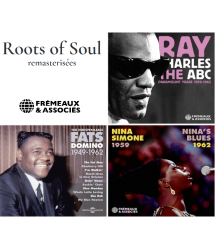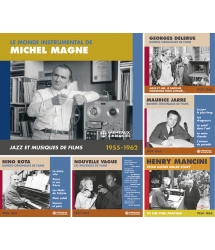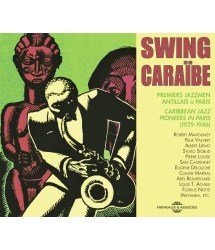As was also the case in Britain, in France Carribean musicians played a significant though discreet role in popularising jazz. This 36-track double CD set is accurately subtitled "Caribbean Jazz Pioneers in Paris (1929-1946) and a fascinating document it is too. The earliest titles are New Orleans styled, and Felix Valvert's solo sax piece was recorded just a few weeks after he had first picked up the instrument, even though he was billed on the 78 label as "le virtuose guadeloupéen" - to be fair, at the time he was known as a good banjo player. However, even as early as 1931 the sound was moving on and becomes closer to contemporary American jazz. There are oddities such as Jean Vaissade's jazz accordion rendition of Al Jolson's "Sonny Boy" or Louis-Thomas Achille's rather formal rendering of "Swing LowSweet Chariot", wich is in the classically influenced style of Paul Robenson (but not a baritone), though with a wayward Hawaian guitar in the accompanying band. Balancing these are such items as the excellent swinging "Sweete Georgia Brown" by Sam Castendet from 1936 (his oth track leans a little more towards dance band sounds) and the sublime guitar duets of Pierre Louise and the late Al(bert) Lirvat. Paris was a cosmopolitan city and many antillean musicians had had contact with American jazzmen. Trumpeter Harry Cooper had the advantage of actually being an American Jazzman, born in lake Charles, Louisiana in 1903 and having worked in the bands of George Lee, Bennie Moten and Duke Ellinton. His eight titles here date from two sessions in 1943-somewhat incredibly, from the years of the Nazi occupation (he had been interned for a short time) and feature international line-ups, though both include Antillean Robert Mavounzy. Also reccorded under the Nazi occupation were the eight titles buy African drummer (from the former German Colony in Camerron, wich enabled him to get a work permit) Fredy Jumbo, leading a mostly carribean personnel, and featuring such excellent band numbers as "Boogie Woogie" (which draws on Count Basie's One O'Clock Jump") and the very bluesy "Oh! cette musique". These recordings seem to indicate that someone was keeping up - clandestinely?- with the latest American trends! The ensemble Swing du Hot-Club Colonial was the first big bang made up of French Carribean musicians, and their sides betray the influence of Count Basie and Lionel Hampton - as do the sides by Léo Chauliac and Jean Ferret. Closing out the set is a jam session thet reveals an awareness of be-bop on the part of saxman Robert Mavounzy - who also opened this collection with a previously unissued side, also from 1946. Thi is a truly fascinating document, well annotated ( though with a truncated English translation) and with some fine vintage photographs. If you want to understand how European appreciation of black American music developped, this is essential, or one to consider if you just have a taste for good jazz. Norman DARWEN-BLUES AND RYTHM











